Welcome to Screen Week! Join us as we explore the films, TV shows, and video games that kept us staring at screens. More from this series
Behold, the vast digital world. In 2018, we created the biggest, longest, most immersive games that the world has ever seen. Shimmering lakes, colossal mountains, dozens of idiosyncratic fighters, epic slam dunks. “Detail porn,” some called it. People may look back at 2018 as a year that we stopped looking at real trees and skies because the false ones were so goddamn attractive that we stopped leaving our houses. Blah blah blah. Boo hoo. Already bored? Same. I wanted to make some points about video games and life, but I’m not going to. Instead, here’s a story of how I came to hate God of War.
I became obsessed with God of War this past summer. I played it harder and longer than any game I’d ever encountered. To my knowledge, PlayStation doesn’t let you track your time, but I wouldn’t be surprised to learn that I played God of War for over 150 hours. And many of those came after I beat the game’s narrative. Indeed, once the plot ended, there was still so much to do that I just couldn’t give it up. Puzzles to conquer, dragons to emancipate, chambers to clear, Valkyries to free. I became entranced by the game’s mythology and obsessed with the minutiae of its world. I was convinced that what I was doing was meaningful. A new piece of armor here, a new weapon upgrade there. But what did it mean? What was the point? Was I even getting anything out of it anymore? When I finally got around to asking myself these questions, I was in the middle of trying to beat a series of challenges that I’d spent dozens of hours on. And when I realized that I didn’t have a good answer, I paused the game in the middle of a fight, walked over to my PS4, ejected the game, and never played it again. Why? Well, to quote John Laroche in Adaptation, “Done with fish.”
Anyway, how you view that story probably has a lot to do with your own philosophy of video games. For more on aesthetic experience, read Kant or Adorno. But if you’re looking for the best video games of 2018 as determined by Tiny Mix Tapes, you’re in the right place. Go forth.
Agatha Knife
Developer: Mango Protocol
[Steam, Nintendo Switch, Xbox One]
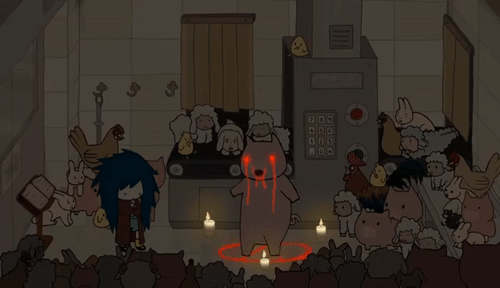
Surface-level nostalgia is quickly becoming played-out in the indie development: 8-bit sidescrollers dominate the virtual marketplace, and “retro” JRPG clones are a dime a disappointing dozen. That said, it’s with great self-awareness that we deem Agatha Knife a charming point-and-click adventure that hearkens back to the early 00s, fusing the angular angst of a mall goth’s Newgrounds animation with the low-key whimsy of a Pajama Sam CD-ROM. Produced by Spanish developer Mango Protocol, the title chronicled a seven-year-old carnivore’s attempts to found a pig-worshipping religion in order to save her mother’s butcher shop. As a skeptical critique of theism, Agatha Knife was as nuanced as the notebook scribblings of a teenager who has just discovered Bright Eyes and Richard Dawkins, but therein lay its appeal: it was irreverent, hilarious, and laden with nerd-culture references, just as any good piece of counterculture should be. Whether the game challenged us to collect library books in a fourth wall-breaking sidequest or had us wax prophetic to a congregation of barnyard animals, Agatha Knife taught us that there’s nothing wrong with letting out a little xD every once in a while.
Celeste
Developer: Matt Makes Games
[PlayStation 4, Xbox One, Nintendo Switch]
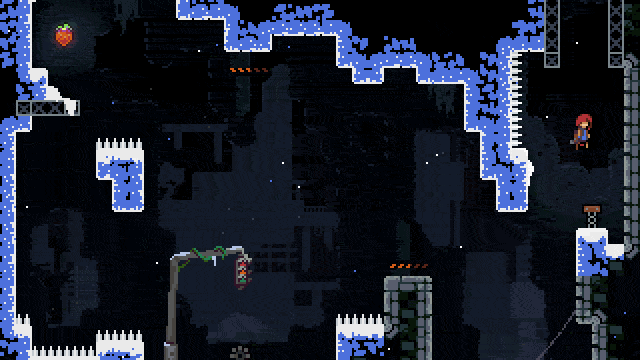
Run. Jump. Don’t touch the thing that kills you. That’s basically how the gameplay works in Celeste. But once you get past that, there’s actually a very affecting story behind it all. I won’t say too much, because I recommend experiencing this game for yourself, but it involves a young girl trying to climb a mountain and finding that her most challenging obstacle may just be herself. I think we can all relate to that, right? But what makes the game truly great is that the existential drama that unfolds in the game jumps right off the screen and into your life as you play it — because this game is hard as fuck. In fact, it’s so difficult and maddening that, before you know it, you’ll find yourself jumping, yelling, throwing things, hating yourself, and, ultimately, thinking about how you experience platformers. For $20, that’s a pretty good deal.
Dream Daddy: Dadrector’s Cut
Developer: Game Grumps
[Windows, Macintosh OS, Linux, PlayStation 4]

Dream Daddy isn’t exactly a good game. Heck, it’s barely even a game — more a parody of visual novels with some PS1-quality minigames interspersed to break up the monotony, tbh — but all caveats aside, Dream Daddy gave me the lion’s share of my favorite game moments of 2018. What should’ve been a facile series of gay jokes revealed itself as a nuanced (and dare I say romantic?) depiction of love’s many forms — fraternal, sexual, and filial — in loss’s wake. Playing alongside my partner, arguing over dating options, parenting strategies, and personal desires, making bad decisions and then committing to them felt more like real life than any bloated and shiny open-world ever could. I didn’t expect to fall in love with Dream Daddy, but here in love I remain.
God of War
Developer: Sony Interactive Entertainment Santa Monica
[PlayStation 4]
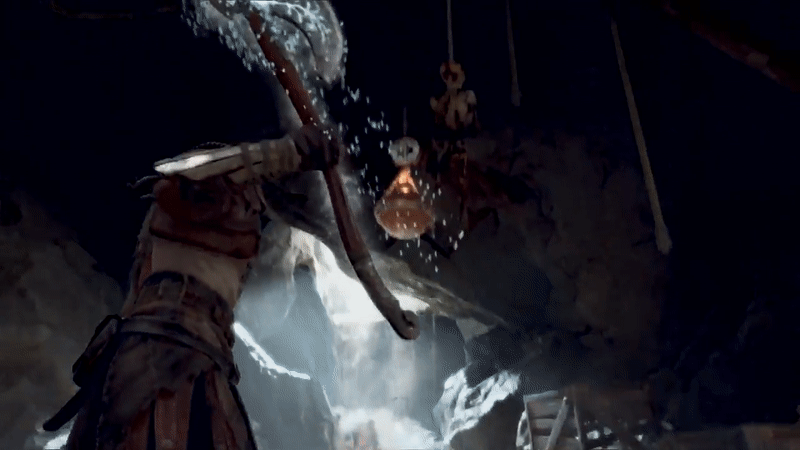
The newest God of War, much like an Oscar-season Iñárritu film, is audaciously displayed, self-serious, laden with both import and portent, and more than a smidge boring. Is the narrative improved by the effort to appear without cuts, as if the GPU were generating a single, continuous 30-odd hour shot in real time? Who knows, but it’s a flex move regardless. As loathe as we at TMT are to champion a billion-dollar corporation’s product, it’s also hard to argue sincerely against God of War’s considerable merits. What other games did well, this one did slightly better. And as far as an iteration within this particular franchise is concerned, it’s a giant leap for God-mankind. Don’t get us wrong, God of War probably wasn’t even the most memorable or resonant mega-budgeted game of 2018, but it’d also be disingenuous to claim that it isn’t exceptional enough to be worth your time.
Hollow Knight
Developer: Team Cherry
[Windows, Macintosh OS, Linux, PlayStation 4, Xbox One, Nintendo Switch]

I’m uncomfortable with superlatives, especially in regards to art. How could any human-made work approach the level of perfection? In my most cynical moments, perfection seems like a crippling, crushing, and impossible ideal. But then I have to grapple with the intricate, soulful (not to mention Souls-like) platformer Hollow Knight, whose every facet is simply *chef’s kiss*. Despite my antipathy toward a critical discourse that upholds even the remotest possibility of perfection, I can’t think of another game released since Symphony of the Night that could better attest to the virtues of games as an interactive artform than Team Cherry’s Hollow Knight. In the six months since its release on the Nintendo Switch (among other platforms), Hollow Knight has accumulated a rarefied reputation almost unheard of in gaming. That a core group of four people could create something so perfectly formed shakes my critical beliefs to their core. It’s one of the best games ever — how could it not make this list?
Iconoclasts
Developer: Konjak
[Windows, Macintosh OS, Linux, PlayStation 4, PlayStation Vita, Nintendo Switch]
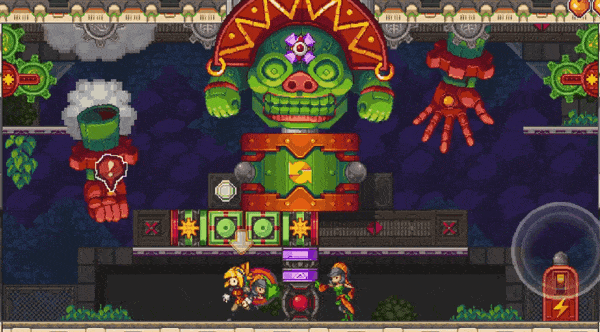
“Life is consequences.”
Could you handle doing the right thing, really? You think you can, but it’s a very tough ask, no matter how you slice it. Doing the right thing means pissing off everyone you know. No, I don’t mean a few people, your enemies, the Other. I mean your friends, your family, the people you love. Yourself. Sometimes “doing right” means hurting them, hurting their feelings, throwing them under a bus. Is that something you can live with? Plus, how can you be sure it’s the right thing? Sometimes you don’t really know what doing right means, and you only have some vague sense of it. Other times you’re so sheltered you don’t recognize your actions have an impact on others. Still other times, you’re just an asshole who can’t acknowledge that maybe you’re wrong sometimes. But this is not to say “doing the right thing” is impossible. It just means everything is consequential. Can you live with the consequences of your actions? Are you willing to accept that you will, and sometimes must, hurt the ones you love? Only then can you begin to say you’re doing the right thing. It’s not much, but it’s a start.
Minit
Developer: Devolver Digital
[Nintendo Switch, Windows, PlayStation 4, Xbox One]

In a time when the norm for video games is to make them as massive as technologically possible (to the point where it’s become common for major releases to hit the marketplace dreadfully unfinished), this year’s Minit took things in the exact opposite direction. What if instead of spending over 100 hours trying to beat a game, you could only play it for 60 seconds at a time? Even with its unbreakable minute-long death cycle, Minit managed to cram all the exploration, world-building, item-grabbing, and swordplay of an O.G. Legend of Zelda title into a teensy tiny package, shaving the entire action/adventure genre down to its barest nubs. As we inched our way forward through its zany island, uncovering hints from helpful ghosts and trying to figure out just what was going on inside that strange factory, Minit revealed just how simple the formula for creating a memorable adventure really is. It may not have taken long to conquer, yet Minit managed to make its microscopic pilgrimage feel like an odyssey.
NBA 2K19
Developer: 2K
[Windows, PlayStation 4, Nintendo Switch, Xbox One]

Rebuke this pick all you want: your arguments are valid. NBA 2K19 is a frustrating and manipulative title designed to sap as much cash as possible from its userbase’s pockets, fueling its own miniature economy built on virtual currency and digitally-rendered footwear. Set to a moody playlist-trap soundtrack that includes cuts by Travis Scott, Trippie Redd, and Billie Eilish, the better part of 2K19’s traffic takes place in the libertarian hellscape that is its “neighborhood.” In this vaguely metropolitan hub, low-ranking scrubs dressed in sweatpants vie for their chance to see action on the court, as designer-dipped avatars with SoundCloud-inspired hairstyles rack up wins on the dime of their IRL counterpart. Broke boys are left to grind out losses to earn sweatbands and boosts to their post offense, waiting for 10 minutes in virtual casino queues to take their daily spin on the prize wheel for a chance to win 50 cents’ worth of in-game currency. (The overworld is eerily similar to this James Ferraro music video in which cg-rendered commuters clip through each other while waiting to board massive subway cars.) 2K’s latest basketball sim succeeds on two levels: it’s as good an allegory for life under the rule of neoliberal ideology and laissez-faire capitalism as you’ll find, but it also makes for a solid game of online hoops. Nerf long-range jumpers, and you’d have what might be the world’s greatest sport game slash anarcho-capitalist manifesto on your hands. Pro-tip: invest in some VC before the inevitable economic collapse renders the US dollar worthless.
Paratopic
Developer: Arbitrary Metric
[Windows, Macintosh OS, Linux]

Nostalgia has always played a major part in the world of video games, but few have weaponized that nostalgia like Paratopic did earlier this year. While it’s become commonplace for games to dip into the arena of 8-bit graphics to inspire warm memories of our childhood, Paratopic reached slightly later in gaming history to bring us waist-deep into the unnerving. Coated in blocky PS1-era graphics that plastered its characters’ faces over barely rendered figures, Paratopic sent us on a miniature spiral into the unknown, jacking us from one strange mission to the next in a plot revolving around smuggled illegal video tapes and mysteriously huge balls of twine. As we watched junkies plead for more tapes until their bodies contorted into disgusting shapes, the story of Paratopic similarly seemed to collapse into itself, leading us down a splintering web of conspiracies, violent eruptions, and bizarre dead-ends. Paratopic was a seedy horror of the recent past — an exorcism of the demons that continue to haunt us as we cruise away into the low-resolution dawn.
Red Dead Redemption 2
Developer: Rockstar
[PlayStation 4, Xbox One]
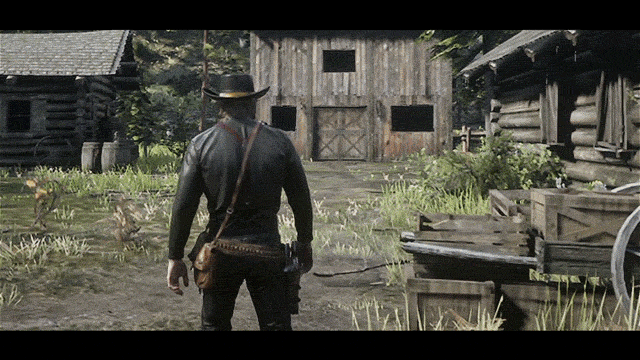
America, 1899. Your gang of ruffians is on the run from the law after a botched heist. What else is new? It’s the Old West, after all. Men and women want to be free, but the modern age is fast approaching. That means actual rules for living in a society, property tax, and boring junk like that. However, there’s a glimmer of hope that all of it can be escaped, that there’s time enough yet to outrun fate, for the outlaw to go on living. So what are you waiting for? Go! Rob a bank, rob a train, rob a one-legged Civil War veteran if you’re feeling especially nasty. Hunt and skin animals in distressingly realistic detail. Pat a mangy dog and let him know he’s a good boy. Save the life of some unfortunate fool who keeps getting attacked by snakes. Gamble. Duel. Fish. Get knocked off your horse by a low-hanging tree branch, and while standing around astounded that that could even happen, get mauled to death by a cougar. An entire country is just sitting there, waiting. All you have to do is get out there and take it.
Return of the Obra Dinn
Developer: Lucas Pope
[Windows, Macintosh OS]

Wryly dubbed “an insurance adventure with minimal colour,” Return of the Obra Dinn is an enormous, livable whodunit, a tonally anomalous story fragmented through the memories of dozens of dead characters and a stylistically audacious mental workout all at once. Despite its murder mystery framework and high-seas theming, the game took a novel approach to the meshing of gameplay and narrative rivaled in recent memory only by developer Lucas Pope’s other game, the towering Papers, Please. Both of Pope’s commercial games rely on players’ ability to juggle a variety of complex information as they complete demanding bureaucratic tasks, but unlike the prescripted, regimented puzzle architecture of Papers, Please, Obra Dinn was more of a sandbox mystery, in which the deductive reasoning and logical calculus of the game took place almost entirely off-screen. The game was also by design much less strident in its messaging, forcing players to use discreet contextual clues buried among its monochromatic fantasy to progress both mechanically and narratively. In yet another year held down by the AAA anvil, Obra Dinn provided real vision in interactive storytelling.
RimWorld
Developer: Ludeon Studios
[Windows, Macintosh OS, Linux]
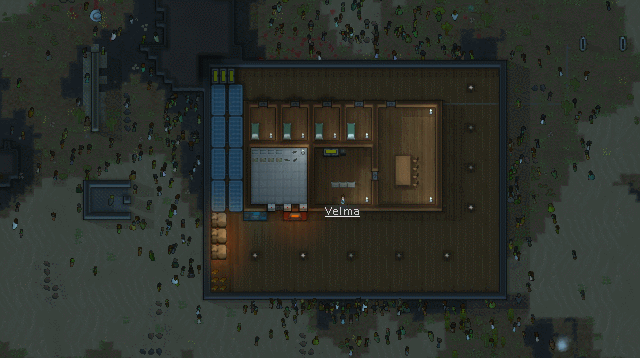
In RimWorld, you are the omniscient supervisor of three strangers, each with their own unique personality, who have crash-landed on a mysterious planet. You have to account for their individual abilities and weaknesses in order to optimize their efforts to protect themselves from the elements, supply themselves with fresh and palatable food, and create the infrastructure and amenities they need to live satisfying lives. Meanwhile, they will be visited by traders, raiders, pirates, refugees, and manhunting animals in events controlled by whichever of the game’s three AI storytellers you choose. Colonists die or run away; they capture and enslave outsiders; and wanderers show up and decide to stick around, leaving you to figure out how to manage the changing cast of personalities. While it’s really, really hard, RimWorld is also fun, poignant, and immersive. It depicts a future bound up with the past, in which the primitive and the futuristic interact with and influence one another. Each game is a study in human vulnerability and interdependence, as the complex relationships that develop between your colonists compete for attention with the existential trials with which they are faced. RimWorld also has a devious sense of humor, furnishing the player with an abundance of randomness and absurdity. While it borrows many of its ideas from Dwarf Fortress, Firefly, Minecraft, and other media, RimWorld is far greater than the sum of its parts. If you have the patience for it, it’s one of the most rewarding and replayable survival games out there.
Slay the Spire
Developer: Mega Crit
[Nintendo Switch, Windows, Linux, Macintosh OS]

Few dare to incorporate board gaming elements into their roguelikes, favoring speedy gameplay and rapid action due to the fickle nature of life inherent in the genre. However, Slay the Spire adds deckbuilding and engine-building elements to create a different experience. Players choose one of three characters (The Ironclad, The Silent, and The Defect) and must slowly work their way up the titular spire over the course of four acts, earning new cards to include in their deck. Each character has its own unique set of cards to earn, with synergy occurring with relics that are earned in special events and boss encounters. This is the complex pleasure that separates Slay the Spire from its kinfolk. Thanks to RNG luck, sometimes these synergies never occur, and you find yourself in a grind up the spire, valiantly losing due to an untimely and unavoidable encounter. But when that synergy is just right (Ironclad + Corruption + Dead Branch), StS is pure bliss. Once you feel comfortable with the combinations of cards, relics, and characters available, StS offers 20 ascension levels, each adding tougher and stronger enemies, more boss encounters, curse cards, and other obstacles to impede your climb.
Super Smash Bros. Ultimate
Developer: Nintendo
[Nintendo Switch]

Super Smash Bros. Ultimate is a masterclass in maximalism. Nearly every corner of the game appears to be fleshed out and tested with both the competitive and casual scenes in mind. From the sheer volume of characters (74) and the pixel-perfect stages (103) to the nostalgia-thirsty spirits (over 1,000) and the tiniest details on certain characters (like Incineroar’s mini-taunts), no stone seems to have been left unturned by Nintendo. Admittedly, the single-player mode World of Light isn’t as immersive as Sakurai promised and the online servers are still somewhat laggy, but the rest of the celebration overshadows both of the game’s major flaws. After hundreds of battles, Ultimate maintains its freshness and festivity. If Nintendo continues to listen to the community and implement patches accordingly, Ultimate will continue to hold up in the coming years.
Vampyr
Developer: Dontnod
[Windows, Xbox One, PlayStation 4]
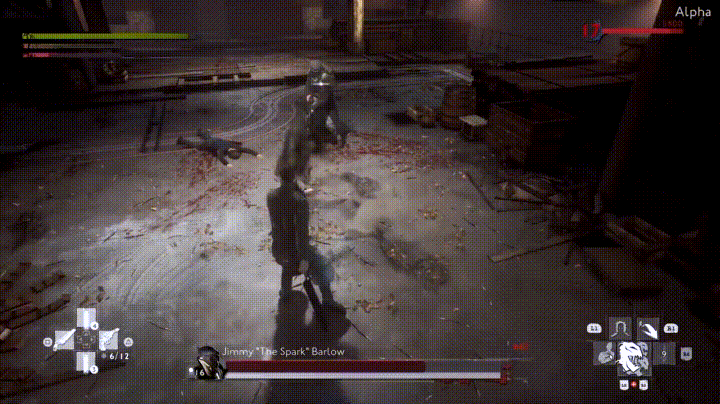
Vampyr is a French simulation of Spanish Flu-era England, which is to say, it’s stiff, stilted, and painfully contrived. I can’t think of a sloppier game I played in 2018, and yet no other dug into me as deeply as Vampyr did. Just as with Life is Strange (and to a lesser extent Remember Me), the technical limitations of Dontnod’s productions make space for humanistic possibilities of which better — or at least higher budgeted — games wouldn’t even dare to imagine, let alone attempt. In an ongoing season of tribal divisions and distrust, I can’t think of more empowering mechanics to build a game around than community building and public health. No matter the choices individual players might make, Vampyr never lets anyone off the hook. It exists to remind you that every single creature in this forsaken world has their stories to tell, predator and prey alike.
Welcome to Screen Week! Join us as we explore the films, TV shows, and video games that kept us staring at screens. More from this series
